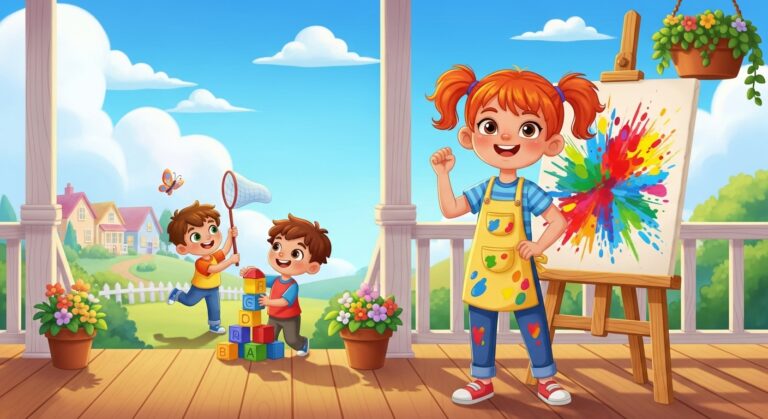In the small town of Willow Creek, where the days blended seamlessly into one another, a young girl named Mia found herself trapped in a cycle of responsibility that had begun when she was just thirteen years old. At eighteen, she was the eldest daughter in a family that had grown too large too quickly, with two younger brothers who relied on her for everything from diaper changes to playtime. While her friends were busy planning their futures and enjoying the carefree days of adolescence, Mia was entrenched in the mundane realities of childhood care.
Mia had always admired her older brother, Jake, who seemed to glide through life with an air of ease. He was the star athlete, the one everyone looked up to, and most importantly, he had the freedom to focus solely on his studies without the burden of babysitting. It was a simple fact that stung Mia deeply; he didn’t even know how to change a diaper, a skill she had perfected out of necessity. While her peers navigated high school dances and college applications, Mia found herself knee-deep in baby wipes and bottles.
The pressure began to mount when she dropped out of her senior year due to a heavy cloud of depression that had settled over her like a thick fog. The decision to leave school had not come lightly; it was a choice made in the quiet hours of the night when her mind was racing, and the weight of her responsibilities felt insurmountable. Even as she sought to reclaim her own identity, her mother’s voice echoed in her head, reminding her of the expectations that came with being the eldest daughter.
Her mother, a fervent germaphobe, believed meticulously cleaning their home was the key to keeping the family healthy. She spent hours scrubbing every surface, her anxiety manifesting in the way she wiped down countertops and sterilized toys. “If I don’t do this, the babies will get sick,” she would say, her voice laced with worry. Mia understood her mother’s intentions but felt suffocated by the weight of it all. Every time she returned home later than expected after hanging out with friends, her mother’s complaints dripped with disappointment.
“Mia, you need to help more with your brothers. I can’t do it all,” her mother would say, the frustration evident in her tone. These conversations often left Mia feeling like a failure, as if her needs and desires were mere afterthoughts in the grand scheme of family life. The guilt of wanting a life of her own gnawed at her.
As the days turned into weeks, Mia reached a breaking point. She loved her brothers, but the burden of being their caretaker was stifling her spirit. One evening, after a particularly exhausting day of cleaning up messes and tending to tantrums, Mia sat on her bed, her heart heavy with resignation. She picked up her phone and began typing a message to her mother, a plea for understanding.
“Mom, I can’t do this anymore. I need to focus on myself. I want to go back to school, but I can’t if I’m constantly babysitting.”
After hitting send, she felt a wave of relief wash over her, but it was quickly followed by anxiety. What if her mother didn’t understand? What if this plea turned into another argument? To her surprise, her mother responded almost immediately.
“Mia, I know it’s a lot. I’m sorry I’ve put so much on you. Can we talk about this?”
The conversation that followed was one Mia had longed for but had never believed would happen. They sat down together, and her mother listened as Mia poured out her heart, expressing her dreams and desires, the suffocating weight of expectation, and her need for autonomy. It was a release, a moment of vulnerability that allowed her mother to see Mia not just as a daughter but as a person with her own hopes and dreams.
“I didn’t realize how much pressure I was putting on you,” her mother admitted, tears in her eyes. “I thought I was doing what was best for the family. I just need some help, but I’ll find a way to balance it better. You deserve your own life too, Mia.”
From that day forward, the dynamic in their household began to shift. They began to seek help from a local daycare for the younger siblings, allowing Mia to reclaim her time and focus on her own education. Slowly but surely, she began to reintegrate herself into the world of learning, signing up for online classes and diving back into her studies.
Mia discovered a newfound sense of freedom, a feeling she hadn’t felt in years. She started spending more time with friends, exploring hobbies, and even rediscovering her love for art, something she had abandoned long ago. As she painted on canvas, vibrant colors bursting forth, she felt a sense of empowerment wash over her. She was not just a caretaker; she was a creator, a student, and a young woman with dreams.
Months passed, and the family found a new rhythm. Mia’s mother learned to balance her need for cleanliness with the reality of raising children. The boys, though still rambunctious, thrived in their new daycare environment, giving their mother the space she needed to breathe and Mia the opportunity to flourish.
In the end, Mia realized that stepping back from her responsibilities didn’t mean she loved her brothers any less. It meant she was learning to love herself, too. As the sun set over Willow Creek one evening, Mia stood on her porch, a paintbrush in hand, and smiled at the vibrant canvas before her—a symbol of her journey toward self-discovery and the beauty of balancing responsibility with dreams.
Create a cartoon-style image of a young girl standing proudly in front of a colorful canvas she has just painted, with her younger brothers playing happily in the background. The setting is a sunny porch in a cozy neighborhood, symbolizing freedom and creativity, with bright colors that evoke a sense of joy and self-discovery.





0 Comments